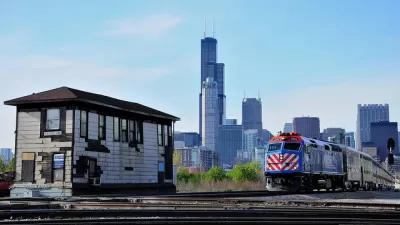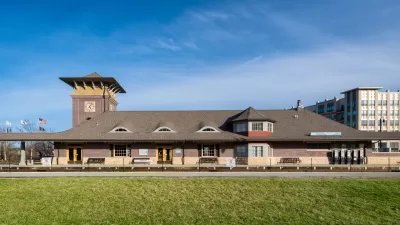The city of Chicago's Equitable Transit Oriented Development Policy Plan prioritizes three key strategies for bringing equity to transit-oriented development.

Chicago's new Equitable Transit Oriented Development Policy Plan, mandated by the city in 2019, was recently released. The plan " required the city to study disparities in the TOD ordinance performance and propose updates to encourage more equitable development. The eTOD plan was developed in partnership with Elevated Chicago. An eTOD Work Group was created to engage over 70 stakeholders representing many city departments, community organizations, the private sector, philanthropic organizations, and regional nonprofit and governmental partners," writes Courtney Cobbs
Cobbs says that a TOD development analysis revealed that between 2016 and 2019, 90% of new projects were located "on the North Side, Northwest Side, in the West Loop, or downtown." Those areas with new projects saw an increase in white residents and a decrease in Black residents, a trend Cobbs says points to displacement patterns.
The eTOD Policy Plan lays out a series of strategies to bring equity to the transit-oriented Development process: "Build the city’s capacity to support eTOD; Making eTOD required, easier, and more equitable; and embedding eTOD principles into Chicago’s citywide planning process."
Cobb lays out highlights from each of the plan's three prioritized strategies, sharing the city's plan for each item.
FULL STORY: Chicago’s Equitable Transit-Oriented Development Plan is a stride forward

Alabama: Trump Terminates Settlements for Black Communities Harmed By Raw Sewage
Trump deemed the landmark civil rights agreement “illegal DEI and environmental justice policy.”

Planetizen Federal Action Tracker
A weekly monitor of how Trump’s orders and actions are impacting planners and planning in America.

Why Should We Subsidize Public Transportation?
Many public transit agencies face financial stress due to rising costs, declining fare revenue, and declining subsidies. Transit advocates must provide a strong business case for increasing public transit funding.

Understanding Road Diets
An explainer from Momentum highlights the advantages of reducing vehicle lanes in favor of more bike, transit, and pedestrian infrastructure.

New California Law Regulates Warehouse Pollution
A new law tightens building and emissions regulations for large distribution warehouses to mitigate air pollution and traffic in surrounding communities.

Phoenix Announces Opening Date for Light Rail Extension
The South Central extension will connect South Phoenix to downtown and other major hubs starting on June 7.
Urban Design for Planners 1: Software Tools
This six-course series explores essential urban design concepts using open source software and equips planners with the tools they need to participate fully in the urban design process.
Planning for Universal Design
Learn the tools for implementing Universal Design in planning regulations.
Caltrans
Smith Gee Studio
Institute for Housing and Urban Development Studies (IHS)
City of Grandview
Harvard GSD Executive Education
Toledo-Lucas County Plan Commissions
Salt Lake City
NYU Wagner Graduate School of Public Service





























